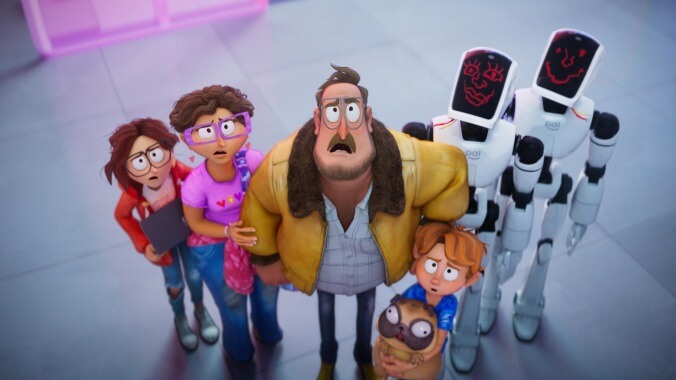The Mitchells Vs. The Machines fights off animated routine with great jokes and characters

At first, The Mitchells Vs. The Machines seems as though it’s working from a checklist of American feature animation’s deadliest sins, compiled by an exhausted movie critic or parent or both. The clichés stack up with abandon. There’s wild, hyperbolic action, which of course slows down for an obligatory ultra-slow-mo gag. There’s expository narration from lead character Katie Mitchell (Abbi Jacobson), accompanying two different freeze-frames (the record scratches are merely implied) and a flashback to the hero’s adorably heartbreaking childhood years. The biggest departure from Big Cartoon orthodoxy plays, initially, like a sop to YouTube-addled children: The movie accentuates its action with hand-drawn-looking onscreen scribbles and bits of multimedia, like needle drops for a post-needle generation. Katie is even a budding YouTuber—though olds in the audience will be relieved to learn that she makes movies starring her little brother Aaron (Michael Rianda) and the googly eyed family dog, rather than unboxing videos.
Katie loves her family, but she’s convinced that her dad, Rick (Danny McBride), and mom, Linda (Maya Rudolph), don’t get her or her film-school aspirations. And here is where the movie starts to zig-zag away from the family-film screenwriting manual. While Linda’s cheerful peacemaking rings familiar, the conflicts between Katie and her father have more nuance. Rick isn’t exactly an angry, forbidding dad; he’s a back-to-nature type who comes by his technological haplessness and disinterest in the glow of smartphone screens honestly and happily. He blanches at Katie’s plans at least in part out of a desire for her to formulate a practical back-up. The movie also strikes a delicate balance in gently implying that Katie’s queerness might contribute to her outside status, even as her parents try to understand her. Katie doesn’t ever say it aloud, much less label a precise sexuality, but her pride-flag pin and verbal allusions to “other reasons” she doesn’t fit in add more realistic undercurrents to her feelings of disconnection from her pre-college life. (And in contrast to vague, Disney-like implications without follow-through, the movie does eventually confirm Katie’s queerness with offhanded dialogue.)
None of this would be groundbreaking stuff in a PG-13 teen movie. In a gag-packed animated comedy about an OS coming to Skynet-like life and sending an army of robots to remove humanity from Earth, though, it’s pretty ambitious. No, The Mitchells Vs. The Machines doesn’t confine its screen-time observations to metaphors: As a synth-y score builds and the Mitchells embark on a last-ditch road trip to drop Katie off at college, a new line of robo-helpers rebel against their masters, efficiently creating a (bloodless, family-friendly) apocalypse. By sheer luck, the Mitchells evade capture and become humanity’s last long-shot hope. When other humans are shipped off to the “rhombus of infinite subjugation” and rogue comic-relief robots voiced by SNL alumni become crucial to the plot, the Mitchells’ animated lineage becomes more clear: This is the latest work godfathered by Phil Lord and Christopher Miller, architects of The Lego Movie, Spider-Man: Into The Spider-Verse, and Cloudy With A Chance Of Meatballs.
Lord and Miller are only producers on The Mitchells Vs. The Machines, the feature writing-directing debut of Michael Rianda and Jeff Rowe, who previously worked on the beloved animated series Gravity Falls. (Rowe also wrote on Disenchantment, the Matt Groening fantasy-comedy that also stars Jacobson as a teenager at odds with her dad.) Whether through experience or intuition, Rianda and Rowe clearly understand animated comedy from the inside out; the gags stretch and snap as readily as the family tensions.
These filmmakers are less self-referential and prankish than Lord and Miller, bringing to life great character gags like little Aaron methodically calling every number in the phone book, asking them whether they’d like to talk about dinosaurs with him. But they share with their producers a way of enlivening old gags; against considerable odds, this movie contains the funniest, best-timed groin-kick this critic has seen in years, as well as a show-stopping cute-things-gone-evil sequence that’s already a buzzy classic after a few days on Netflix, where Sony sold the movie after some pandemic release-date shuffles. Though this will surely make the movie more accessible to family audiences right now, it’s a shame that Mitchells has been separated from its predecessors: The rapid-fire verbal and visual gags, wedded to some neat sci-fi design work, feel like an organic evolution of the bouncy Sony Animation style seen in the Cloudy movies, as well as the Hotel Transylvania series. (If Mitchells isn’t quite on the Spider-Verse level, well, what is?)
By 30 minutes in, the movie has fully reshaped its cartoon familiarity into something funny and affecting; by about 30 minutes from the drawn-out end, it starts to get a little cocky. In addition to resolving the Katie/Rick story, Rianda and Rowe keep throwing in material positioning the Mitchells as the ultimate dysfunctional family of weirdos no one expects to win, a storyline that’s neither well-developed nor especially novel (as ever, Simpsons did it!). If the movie occasionally feels like the famous Pixar-style “plussing” technique kicked into overdrive, at least it’s an open-hearted form of overdrive, full of genuine love for its goofy, bespectacled characters. Despite the millions of dollars poured into big-studio animation, for one to turn out this sweet and funny might still count as an underdog victory.